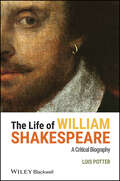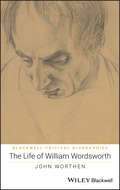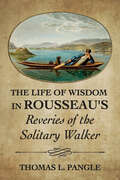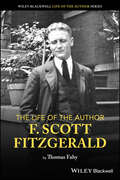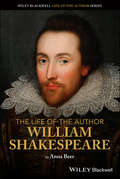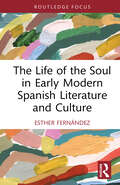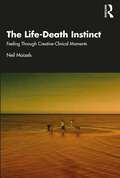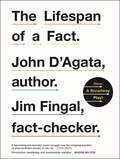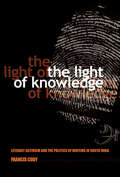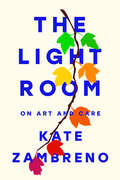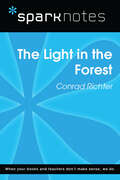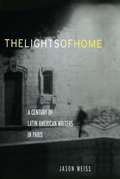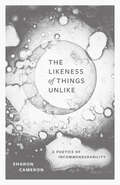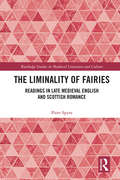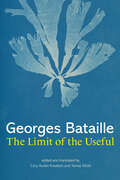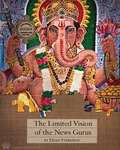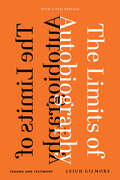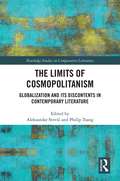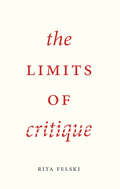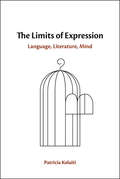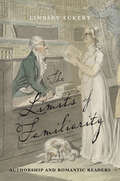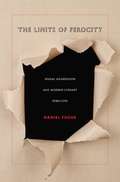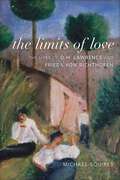- Table View
- List View
The Life of William Shakespeare
by Lois PotterThe Life of William Shakespeare is a fascinating and wide-ranging exploration of Shakespeare's life and works focusing on oftern neglected literary and historical contexts: what Shakespeare read, who he worked with as an author and an actor, and how these various collaborations may have affected his writing. Written by an eminent Shakespearean scholar and experienced theatre reviewer Pays particular attention to Shakespeare's theatrical contemporaries and the ways in which they influenced his writing Offers an intriguing account of the life and work of the great poet-dramatist structured around the idea of memory Explores often neglected literary and historical contexts that illuminate Shakespeare's life and works
The Life of William Wordsworth: A Critical Biography (Wiley Blackwell Critical Biographies)
by John WorthenBy examining the family and financial circumstances of Wordsworth’s early years, this illuminating biography reshapes our understanding of the great Romantic poet’s most creative period of life and writing. Features new research into Wordsworth’s financial situation, and into how the poet and his family survived financially Offers a new understanding of the role of his great unwritten poem ‘The Recluse’ Presents a new assessment of the relationship between Wordsworth and Coleridge
The Life of Wisdom in Rousseau's "Reveries of the Solitary Walker"
by Thomas L. PangleThe Life of Wisdom in Rousseau's "Reveries of the Solitary Walker" is the first complete exegesis and interpretation of Rousseau's final and culminating work, showing its full philosophic and moral teaching. The Reveries has been celebrated as a work of literature that is an acknowledged acme of French prose writing. Thomas L. Pangle argues that this aesthetic appreciation necessitates an in-depth interpretation of the writing's complex and multileveled intended teaching about the normatively best way of life—and how essential this is for a work that was initially bewildering.Rousseau stands out among modern political philosophers in that he restored, to political philosophy, what Socrates and his students (from Plato and Xenophon through Aristotle and the Stoics and Cicero) had made central—and that the previous modern, Enlightenment philosophers had eclipsed: the study of the life and soul of the exemplary, independent sage, as possessor of "human wisdom." Rousseau made this again the supreme theme and source of norms for political philosophy and for humanity's moral as well as civic existence.In his analysis of The Reveries, Pangle uncovers Rousseau's most profound exploration and articulation of his own life, personality, soul, and thought as "the man of nature enlightened by reason." He describes, in Rousseau's final work, the fullest embodiment of the experiential wisdom from which flows and to which points Rousseau's political and moral philosophy, his theology, and his musical and literary art.
The Life of the Author: F. Scott Fitzgerald (The Life of the Author)
by Thomas FahyExplores how F. Scott Fitzgerald's short stories reveal the full depth of his life and literary genius The Life of the Author: F. Scott Fitzgerald presents a compelling case for reevaluating the writer's most overlooked body of work—his short fiction. While Fitzgerald is best known for The Great Gatsby, Thomas Fahy presents him as one of the most important and prolific short story writers in the twentieth century. Fitzgerald penned a staggering 183 stories in his lifetime, and these works provide a nuanced understanding of his life and artistry. They fill in important gaps between his novels, and they are essential for appreciating the scope and sophistication of Fitzgerald's artistic vision, the range of his cultural commentary, the vicissitudes of his troubled life, and his ability to inspire generations of readers. In addition to discussing Zelda's important contributions to her husband's work, this unique volume responds to a need in Fitzgerald studies for a more comprehensive examination of his short fiction. By placing these short works alongside Fitzgerald's celebrated novels, Fahy maps out the evolution of his ideas, characters, style, and social commentary. He also explores the way Fitzgerald translated his personal experiences into lasting art. An accessible yet rigorous resource for appreciating the subtlety and range of Fitzgerald's writing, The Life of the Author: F. Scott Fitzgerald: Offers the first sustained biographical and critical analysis centered on Fitzgerald's short fiction Provides fresh interpretations of Fitzgerald's artistic development as a fiction and nonfiction writer Connects Fitzgerald's life experiences to specific short stories,novels, and nonfiction Situates Fitzgerald's work within the broader context of American literary modernism and the 1920s Integrates cultural history to illuminate the historical relevance of Fitzgerald's work Examines Fitzgerald's relationship with and influence on popular culture A timely addition to the body of Fitzgerald scholarship at the centennial of The Great Gatsby, The Life of the Author: F. Scott Fitzgerald is ideal for undergraduate and graduate students in courses on twentieth-century American literature, American Modernism, the Roaring Twenties, and seminars on American modernists such as Ernest Hemingway, John Dos Passos, T. S. Eliot, and Gertrude Stein. It supports degree programs in English, American Studies, and Cultural Studies, and it is a valuable resource for literary scholars, educators, and general readers alike.
The Life of the Author: William Shakespeare (The Life of the Author)
by Anna BeerDiscover an invigorating new perspective on the life and work of William Shakespeare The Life of the Author: William Shakespeare delivers a fresh and exciting new take on the life of William Shakespeare, offering readers a biography that brings to the foreground his working life as a poet, playwright, and actor. It also explores the nature of his relationships with his friends, colleagues, and family, and asks important questions about the stories we tell about Shakespeare based on the evidence we actually have about the man himself. The book is written using scholarly citations and references, but with an approachable style suitable for readers with little or no background knowledge of Shakespeare or the era in which he lived. The Life of the Author: William Shakespeare asks provocative questions about the playwright-poet’s preoccupation with gender roles and sexuality, and explores why it is so challenging to ascertain his political and religious allegiances. Conservative or radical? Misogynist or proto-feminist? A lover of men or women or both? Patriot or xenophobe? This introduction to Shakespeare’s life and works offers no simple answers, but recognizes a man intensely responsive to the world around him, a playwright willing and able to collaborate with others and able to collaborate with others, and, of course, his exceptional, perhaps unique, contribution to literature in English. The book covers the entirety of William Shakespeare’s life (1564-1616), taking him from his childhood in Stratford-upon-Avon to his success in the theatre world of London and then back to his home town and comfortable retirement. The Life of the Author: William Shakespeare sets his achievement as a writer within the dangerous, vibrant cultural world that was Elizabethan and Jacobean England, revealing a writer’s life of frequent collaboration, occasional crisis, but always of profound creativity. Perfect for undergraduate students in Literature, Drama, Theatre Studies, History, and Cultural Studies courses, The Life of the Author: William Shakespeare will also earn a place in the libraries of students interested in Gender Studies and Creative Writing.
The Life of the Soul in Early Modern Spanish Literature and Culture (Routledge Focus on Literature)
by Esther FernándezUnderstanding the soul’s essence is an elusive pursuit, rendering any attempt to write about it akin to grasping at a mirage. As a sublime subject, the soul has captivated human thought for centuries. How do we approach it? How can we define its boundaries? This exploration offers an experimental investigation into the soul’s complexities during one of Spain’s most turbulent periods—the dawn of modernity. Set against the spiritual backdrop of the 17th century, these reflections examine how materiality ensnared individuals in artifice, often neglecting expansionism’s social and political consequences. The Twelve Years’ Truce (1609) and the Thirty Years’ War (1618–1648) marked critical moments of instability, further compounded by economic depression and social turmoil. In this landscape of despair, the Spanish soul sought refuge inwardly and through indulgence in worldly pleasures. Through metaphysical inquiry, emotional depth, and the role of animated matter in art and theater, this book reflects on existence amid the illusions of early modern Spain.
The Life-Death Instinct: Feeling Through Creative-Clinical Moments
by Neil MaizelsThroughout this enlightening collection, Neil Maizels considers the helical tandem between the Life Instinct and the Death drive in the light of canonical literary figures like Thomas Hardy, Patricia Highsmith, Sylvia Plath and Shakespeare, classic filmmakers like Hitchcock and contemporary television shows such as Curb Your Enthusiasm, The West Wing and Succession. This light is filtered through intricate clinical work whereby Maizels seeks to illustrate and expound on the strength and indefatigability of the Life Instinct. He makes a case for it as the relentless driver of integration and “binding” in the ever-growing, expansive psyche. He considers both Freud’s original equation of the Life Instinct with Eros and a widening interconnecting love of mankind, and Melanie Klein’s with gratitude and creative reparation. This book is a multi-layered presentation of the clinical and theoretical work of Neil Maizels as it has evolved and convolved over several decades. It places the feeling through of one’s conflicts at the heart of the mind’s generation of a unique identity, equipped to evolve its own unique form of creative spirit in the face of life’s most pressing psychological challenges: the limitation of time, and reciprocated beauty. The Life-Death Instinct: Feeling Through Creative-Clinical Moments is important reading for anyone seeking to expand their knowledge in this fascinating intersection of psychoanalysis and the arts.
The Lifespan of a Fact: Now a Broadway Play
by John D'Agata Jim FingalNOW A BROADWAY PLAY STARRING DANIEL RADCLIFFE'Provocative, maddening and compulsively readable' Maggie NelsonIn 2003, American essayist John D'Agata wrote a piece for Harper's about Las Vegas's alarmingly high suicide rate, after a sixteen-year-old boy had thrown himself from the top of the Stratosphere Tower.The article he delivered, 'What Happens There', was rejected by the magazine for inaccuracies. But it was soon picked up by another, who assigned it a fact checker: their fresh-faced intern, and recent Harvard graduate, Jim Fingal. What resulted from that assignment, and beyond the essay's eventual publication in the magazine, was seven years of arguments, negotiations, and revisions as D'Agata and Fingal struggled to navigate the boundaries of literary nonfiction.This book includes an early draft of D'Agata's essay, along with D'Agata and Fingal's extensive discussion around the text. The Lifespan of a Fact is a brilliant and eye-opening meditation on the relationship between 'truth' and 'accuracy', and a penetrating conversation about whether it is appropriate for a writer to substitute one for the other.'A fascinating and dramatic power struggle over the intriguing question of what nonfiction should, or can, be' Lydia Davis
The Lifetime Reading Plan
by Clifton FadimanFrom Homer to Hawthorne, Plato to Pascal, and Shakespeare to Solzhenitsyn, the great writers of Western civilization can be found in its pages. In addition, this new edition offers a much broader representation of women authors.
The Light Of Knowledge: Literacy Activism and the Politics of Writing in South India (Expertise: Cultures and Technologies of Knowledge)
by Francis CodySince the early 1990s hundreds of thousands of Tamil villagers in southern India have participated in literacy lessons, science demonstrations, and other events designed to transform them into active citizens with access to state power. These efforts to spread enlightenment among the oppressed are part of a movement known as the Arivoli Iyakkam (the Enlightenment Movement), considered to be among the most successful mass literacy movements in recent history. In The Light of Knowledge, Francis Cody’s ethnography of the Arivoli Iyakkam highlights the paradoxes inherent in such movements that seek to emancipate people through literacy when literacy is a power-laden social practice in its own right. The Light of Knowledge is set primarily in the rural district of Pudukkottai in Tamil Nadu, and it is about activism among laboring women from marginalized castes who have been particularly active as learners and volunteers in the movement. In their endeavors to remake the Tamil countryside through literacy activism, workers in the movement found that their own understanding of the politics of writing and Enlightenment was often transformed as they encountered vastly different notions of language and imaginations of social order. Indeed, while activists of the movement successfully mobilized large numbers of rural women, they did so through logics that often pushed against the very Enlightenment rationality they hoped to foster. Offering a rare behind-the-scenes look at an increasingly important area of social and political activism, The Light of Knowledge brings tools of linguistic anthropology to engage with critical social theories of the postcolonial state.
The Light Room
by Kate Zambreno&“Kate Zambreno has invented a new form. It is a kind of absolute present, real life captured in closeup.&“ —Annie Ernaux, winner of the Nobel Prize in Literature From &“one of our most formally ambitious writers&” (Esquire), a moving account of caretaking in a time of uncertainty and lossIn The Light Room, Zambreno offers her most profound and affecting work yet: a candid chronicle of life as a mother of two young daughters in a moment of profound uncertainty about public health, climate change, and the future we can expect for our children. Moving through the seasons, returning often to parks and green spaces, Zambreno captures the isolation and exhaustion of being home with a baby and a small child, but also small and transcendent moments of beauty and joy. Inspired by writers and artists ranging from Natalia Ginzburg to Joseph Cornell, Yūko Tsushima to Bernadette Mayer, Etel Adnan to David Wojnarowicz, The Light Room represents an impassioned appreciation of community and the commons, and an ecstatic engagement with the living world.How will our memories, and our children&’s, be affected by this time of profound disconnection? What does it mean to bring new life, and new work, into this moment of precarity and crisis? In The Light Room, Kate Zambreno offers a vision of how to live in ways that move away from disenchantment, and toward light and possibility.
The Light in the Forest (SparkNotes Literature Guide Series)
by SparkNotesThe Light in the Forest (SparkNotes Literature Guide) by Conrad Richter Making the reading experience fun! Created by Harvard students for students everywhere, SparkNotes is a new breed of study guide: smarter, better, faster. Geared to what today's students need to know, SparkNotes provides: *Chapter-by-chapter analysis *Explanations of key themes, motifs, and symbols *A review quiz and essay topicsLively and accessible, these guides are perfect for late-night studying and writing papers
The Lights of Home: A Century of Latin American Writers in Paris
by Jason WeissFirst published in 2003. Routledge is an imprint of Taylor & Francis, an informa company.
The Likeness of Things Unlike: A Poetics of Incommensurability
by Sharon CameronA study of the incommensurable, often discordant elements that define major works of American literature. In Sharon Cameron’s essays, a magnetic constellation gathers works of Emerson, Whitman, Dickinson, Cather, and Stevens—each manifesting in its own terms “the likeness of things unlike”—to form a loose commonality in a strain of American writing in which incommensurable elements can’t be integrated and can’t be separated. The Likeness of Things Unlike is concerned with discordant elements of an aesthetic work and argues that these elements refigure the aesthetic wholes whose integrity they apparently violate. These intertwined, subversive elements are challenges to literary systems and are essentially philosophical in their rethinking of categories, and thus go beyond the aesthetic particulars that exemplify them. Cameron is known for rigorously and brilliantly connecting artistic achievement to radical ways of thinking. Georg Lukcás describes the essayist as one who “adapts himself to the essay’s ‘smallness’ of form—the eternal smallness of the most profound work of the intellect in [the] face of life.” With The Likeness of Things Unlike Cameron powerfully demonstrates Lukács’s remarkable insight.
The Lily and the Thistle
by William CalinIn The Lily and the Thistle, William Calin argues for a reconsideration of the French impact on medieval and renaissance Scottish literature. Calin proposes that much of traditional, medieval, and early modern Scottish culture, thought to be native to Scotland or primarily from England, is in fact strikingly international and European. By situating Scottish works in a broad intertextual context, Calin reveals which French genres and modes were most popular in Scotland and why. The Lily and the Thistle provides appraisals of medieval narrative texts in the high courtly mode (equivalent to the French "dits amoureux"); comic, didactic, and satirical texts; and Scots romance. Special attention is accorded to texts composed originally in French such as the Arthurian "Roman de Fergus," as well as to the lyrics of Mary Queen of Scots and little known writers from the French and Scottish canons. By considering both medieval and renaissance works, Calin is able to observe shifts in taste and French influence over the centuries.
The Liminality of Fairies: Readings in Late Medieval English and Scottish Romance
by Piotr SpyraExamining the fairies of medieval romance as liminal beings, this book draws on anthropological and philosophical studies of liminality to combine folkloristic insights into the nature of fairies with close readings of selected romance texts. Tracing different meanings and manifestations of liminality in Sir Gawain and the Green Knight, Sir Orfeo, Sir Launfal, Thomas of Erceldoune and Robert Henryson’s Orpheus and Eurydice, the volume offers a comprehensive theory of liminality rooted in structuralist anthropology and poststructuralist theory. Arguing that romance fairies both embody and represent the liminal, The Liminality of Fairies posits and answers fundamental theoretical questions about the limits of representation and the relationship between romance hermeneutics and criticism. The interdisciplinary nature of the argument will appeal not just to medievalists and literary critics but also to anthropologists, folklorists as well as scholars working within the fields of cultural history and contemporary literary theory.
The Limit of the Useful
by Georges BatailleThe first English-language translation of an essential, early work key to understanding the French philosopher's later thought.In the decade prior to the publication of Inner Experience (L&’expérience intérieure), the twentieth-century French philosopher Georges Bataille produced a nascent masterwork containing some of his most original and extensive reflections on a range of subjects. With thoughts on ritual sacrifice and military conquest, the nature of laughter, and the mechanisms of capitalism, The Limit of the Useful, as Bataille had planned to title the work, illuminates the philosopher&’s later corpus, yet it remained unfinished and unpublished in his lifetime, and untranslated until now. This is the first English-language translation of what Cory Austin Knudson and Tomas Elliott argue is one of Bataille&’s most structurally consistent works. Paired with draft essays and plans for The Accursed Share, along with over a hundred pages of appendixes and notes, the volume distinctively elaborates Bataille&’s thought. The Limit of the Useful spans a decade of rich intellectual ferment in Bataille&’s life as he first formulated his challenge to capitalism, engaging with concepts and ideas in ways not seen in his other published works. The volume bridges the gap between Bataille&’s surrealist literary writings and later scientific pretensions, drawing attention to, and filling in, an overlooked lacuna in his oeuvre.
The Limited Vision of the News Gurus
by Dean StarkmanDean Starkman takes on what has become a dominant perspective on the future of news in the digital age as personified by three well known media thinkers — Jay Rosen, Clay Shirky, and Jeff Jarvis — who have dominated the "future of news" debate. Starkman makes a powerful case that the perspective that these three represent, despite their many useful insights, is in the end corrosive to public-service journalism.
The Limits of Autobiography: Trauma and Testimony
by Leigh GilmoreIn The Limits of Autobiography, Leigh Gilmore analyzes texts that depict trauma by combining elements of autobiography, fiction, biography, history, and theory in ways that challenge the constraints of autobiography. Astute and compelling readings of works by Michel Foucault, Louis Althusser, Dorothy Allison, Mikal Gilmore, Jamaica Kincaid, and Jeanette Winterson explore how each poses the questions "How have I lived?" and "How will I live?" in relation to the social and psychic forms within which trauma emerges. First published in 2001, this new edition of one of the foundational texts in trauma studies includes a new preface by the author that assesses the gravitational pull between life writing and trauma in the twenty-first century, a tension that continues to produce innovative and artful means of confronting kinship, violence, and self-representation.
The Limits of Cosmopolitanism: Globalization and Its Discontents in Contemporary Literature (Routledge Studies in Comparative Literature)
by Aleksandar Stevic Philip Tai-Hang TsangThis book examines the limits of cosmopolitanism in contemporary literature. In a world in which engagement with strangers is no longer optional, and in which the ubiquitous demands of globalization clash with resurgent localist and nationalist sentiments, cosmopolitanism is no longer merely a horizon-broadening aspiration but a compulsory order of things to which we are all conscripted. Focusing on literary texts from such diverse locales as England, Algeria, Sweden, former Yugoslavia, and the Sudan, the essays in this collection interrogate the tensions and impasses in our prison-house of cosmopolitanism.
The Limits of Critique
by Rita FelskiWhy must critics unmask and demystify literary works? Why do they believe that language is always withholding some truth, that the critic's task is to reveal the unsaid or repressed? In this book, Rita Felski examines critique, the dominant form of interpretation in literary studies, and situates it as but one method among many, a method with strong allure--but also definite limits. Felski argues that critique is a sensibility best captured by Paul Ricoeur's phrase "the hermeneutics of suspicion. " She shows how this suspicion toward texts forecloses many potential readings while providing no guarantee of rigorous or radical thought. Instead, she suggests, literary scholars should try what she calls "postcritical reading": rather than looking behind a text for hidden causes and motives, literary scholars should place themselves in front of it and reflect on what it suggests and makes possible. By bringing critique down to earth and exploring new modes of interpretation, The Limits of Critique offers a fresh approach to the relationship between artistic works and the social world.
The Limits of Expression: Language, Literature, Mind
by Patricia KolaitiTaking as its starting point what is sometimes called 'the prison house of language' - the widespread feeling that language falls terribly short when it comes to articulating the rich and disparate contents of the human mental tapestry - this book sets out a radically new view of the interplay between language, literature and mind. Shifting the focus from the literary text itself to literature as a case of human agency, it reconsiders a wide range of interdisciplinary issues including the move from world to mind, the existence or otherwise of a property of literariness or essence of art, the nature of literature as a unique output of human cognition and the possible distinctiveness of the mind that creates it. In constant dialogue with philosophy, linguistics and the cognitive sciences, this book offers an invaluable new treatment of literature and literary language and sketches novel directions for literary study in the twenty-first century.
The Limits of Familiarity: Authorship and Romantic Readers (Transits: Literature, Thought & Culture 1650-1850)
by Lindsey EckertWhat did Wordsworth wear, and where did he walk? Who was Byron’s new mistress, and how did his marriage fare? Answers—sometimes accurate, sometimes not—were tantalizingly at the ready in the Romantic era, when confessional poetry, romans à clef, personal essays, and gossip columns offered readers exceptional access to well-known authors. But at what point did familiarity become overfamiliarity? Widely recognized as a social virtue, familiarity—a feeling of emotional closeness or comforting predictability—could also be dangerous, vulgar, or boring. In The Limits of Familiarity, Eckert persuasively argues that such concerns shaped literary production in the Romantic period. Bringing together reception studies, celebrity studies, and literary history to reveal how anxieties about familiarity shaped both Romanticism and conceptions of authorship, this book encourages us to reflect in our own fraught historical moment on the distinction between telling all and telling all too much.
The Limits of Ferocity: Sexual Aggression and Modern Literary Rebellion
by Daniel FuchsThe Limits of Ferocity is a powerful critique of the culture of extremity represented in the works of D. H. Lawrence, Georges Bataille, Henry Miller, and Norman Mailer. Daniel Fuchs provides close readings of their literary and intellectual texts, which convey a loathing of middle-class culture or, as the case may be, society itself, in favor of a rebellion often expressed as an aggressive, even apocalyptic, sexuality. The Marquis de Sade is the precursor of this literature, which idealizes the self that violates taboos and laws in the search for erotic transcendence. Fuchs shows as well how these writers reflected and contributed to a broader cultural assault on liberal moderation and Freudian humanism. He explains Freud's theories of culture and sexual aggression and describes how they were rejected or reworked, sometimes in favor of a liberating violence, by theorists including Wilhelm Reich, Norman O. Brown, and Gilles Deleuze and Flix Guattari. Fuchs concludes with a reflection on books by William Burroughs, Bret Easton Ellis, and the sociologist Philip Rieff. This absorbing study illuminates the utopianism and narcissism in works of intellectual and artistic "ferocity" that characterized the turn in American consciousness from the period after the Second World War to the late 1960s and 1970s.
The Limits of Love: The Lives of D. H. Lawrence and Frieda von Richthofen
by Michael SquiresThe Limits of Love: The Lives of D. H. Lawrence and Frieda von Richthofen provides a candid look at two illustrious people who tested the capacity—and the limits—of marriage. The Lawrences come alive not as simple quarreling travelers, nor as blissful domestic partners, but as complex personalities who experimented with marriage to see if it would fulfill their needs. Their antagonisms and their sexual experiences informed Lawrence’s fearless novels The Rainbow and Women in Love. Both works also tested the boundaries of public taste and faced harsh receptions.The cost of the Lawrences’ strong but unstable marriage was high. Despite periods of happiness and peace, angry clashes meant separations and uneasy agreements to repair the marital intimacy when it cracked. Fractures of 1916, 1919, 1923, and 1926 healed slowly and with difficulty. In Lawrence’s most calculated and famous work, Lady Chatterley’s Lover, he successfully coded their marital stress and, full of rage, fused two stories of failed marriages.Drawing on many unpublished and recently discovered letters, The Limits of Love offers readers a detailed reconstruction of two complicated lives, written with narrative speed and a forceful style, filled with vivid interpretations of Lawrence’s work, and conveying deep sympathy for people living outside established norms. This new dual biography, based on years of research by Michael Squires, captures the essence of Lawrence and Frieda, making the couple real, alive, and accessible.
